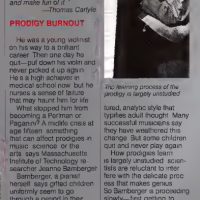He was a young violinist on his way to a brilliant career. Then one day he quit—-put down his violin and never picked it up again. He’s a high achiever in medical school now, but he nurses a sense of failure that may haunt him for life.
What stopped him from becoming a Perlman or Paganini? A midlife crisis at age fifteen, something that can affect prodigies in music, science or the arts says Massachusetts Institute of Technology researcher Jeanne Bamberger.
Bamberger, a pianist herself, says gifted children uniformly seem to go through a period in their teens when the music that once came so naturally no longer seems to flow. The problem occurs because the way children learn is different from the way adults do. Like children with less developed talents, the child prodigy learns much of his music intuitively. But as he enters adulthood he must relearn his skills, fitting them into the more structured, analytic style that typifies adult thought. Many successful musicians say they have weathered this change. But some children quit and never play again.
How prodigies learn is largely unstudied–scientists are reluctant to interfere with the delicate process that makes genius. So Bamberger is proceeding slowly-—first getting to know gifted children, and then testing them on computers and musical bells to see how they organize notes. She’s also helped organize a network of behavioral scientists who will hold two conferences this year on how gifted children learn. The results may explain why some prodigies fail so painfully.
-—Douglas Starr
Starr, Douglas. “Prodigy Burnout.” OMNI, Apr. 1983, p. 39.
See OMNI, Jeanne Bamberger

